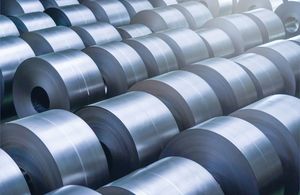UK proposes anti-dumping measures on Cold Rolled Flat Steel from China and Russia be kept
The Trade Remedies Authority (TRA) has proposed that existing measures on imports of Cold Rolled Flat Steel from China and Russia be maintained.

Cold Rolled Flat Steel
- UK TRA proposes anti-dumping measures on Cold Rolled Flat Steel from China and Russia be kept for a further five years
- 40-50% of UK market for Cold Rolled Flat Steel is made up of domestic production
- Downstream businesses have a combined turnover of £685m per year
In its initial findings, the UK’s Trade Remedies Authority (TRA) has today (31 March 2022) proposed that existing measures on imports of Cold Rolled Flat Steel from China and Russia be maintained.
The TRA’s provisional findings, contained in the Statements of Essential Facts (SEF), would mean that this UK industry, predominantly based in South Wales, continues to be protected from dumped products from China and Russia. A 30-day period for comments is now open.
Investigation findings
Following a transition review, the TRA has recommended that anti-dumping measures be kept on certain Cold Rolled Flat Steel products from China and Russia.
Cold Rolled Flat Steel is used in the manufacture of parts for the automotive industry and domestic appliances, as well as other goods. It can be found in such consumer products as radiators, steel drums, domestic appliances, racking, shelving and metal furniture.
The UK market for Cold Rolled Flat Steel includes 40-50% made domestically. The remainder of UK demand is met by imports.
A large proportion of sales are made through steel service centres that carry out processing to meet customer requirements. The remaining sales are direct to generally large customers in the automotive, construction and engineering sectors.
The TRA identified between 50 to 100 downstream Cold Rolled Flat Steel customers, across a wide range of businesses. During 2019, these selected downstream businesses employed at least 1,652 people and had a combined turnover of £685 million.
However, the industry is currently vulnerable, due in part to raw material prices, the COVID-19 pandemic, long-term economic trends and energy costs. The TRA received submissions arguing that if dumping were to occur again, imports would be likely to cause further significant injury.
The TRA has therefore recommended that the measures on Cold Rolled Flat Steel be maintained at their current levels until 5 August 2026 – that is five years subsequent to the date when the measure would have expired (5 August 2021) had no transition review been initiated.
Following today’s publication, there will be a 30-day period in which interested parties can comment on the report. Comments can be submitted by Interested Parties to the TRA via the Trade Remedies Service website.
The TRA will then consider and produce a Final Recommendation, which will be sent to the Secretary of State for International Trade who will make the final decision on whether to uphold the TRA’s recommendation.
The findings set out in this SEF do not include consideration of how the Russian invasion of Ukraine and associated sanctions could affect future imports as the situation is still unfolding and the overall impact upon this product is unclear. Interested parties are invited to make contributions before the final recommendation including in relation to the Russian invasion of Ukraine and associated sanctions.
Notes to Editors
- The Trade Remedies Authority (TRA) is the independent UK body, established in June 2021, as the first non-departmental public body of the Department for International Trade, that investigates whether trade remedy measures are needed to counter unfair import practices and unforeseen surges of imports.
- Read more about the TRA’s mission in its Business Plan.
- Anti-dumping duties allow a country or union to take action against goods sold at less than their normal value, which is defined as the price for ‘like goods’ sold in the exporter’s home market.
- Trade remedy investigations were carried out by the EU Commission on the UK’s behalf until the UK left the EU. Forty-four EU trade remedy measures of interest to UK producers were carried across into UK law when the UK left the EU and the TRA is currently reviewing each one to assess whether it is suitable for UK needs.